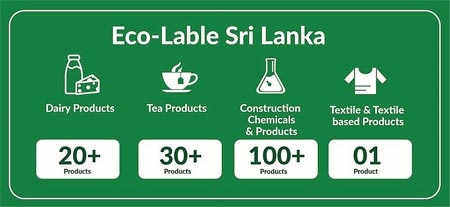Saturday Feb 21, 2026
Saturday Feb 21, 2026
Thursday, 29 February 2024 04:51 - - {{hitsCtrl.values.hits}}

Understanding the Significance and Impact of Eco Labelling in Opening Doors to New Markets & Shaping Sustainable Consumption Habits
The 19th century’s industrial expansion brought not only technological advancements but also significant environmental degradation. In response to this, a generation of activists advocated for change, laying the groundwork for the sustainability movement we are familiar with today. As the 20th century unfolded, increased awareness of the environmental and social impacts of unregulated industrial growth led to a growing dialogue on sustainability. It was in this century that one of the most visible and impactful solutions to these challenges was introduced: Eco-labels. Eco-labelling is a way of telling consumers about the environmental credentials of a product. Over the years, Eco-labels and sustainability standards have become essential tools in the global market, serving as a bridge between environmentally conscious consumers and producers.
 What is Eco-labelling?
What is Eco-labelling?
"Eco-labelling" is a voluntary approach used globally for certifying and labeling environmental performance. It involves identifying products or services that demonstrate superior environmental preferences within specific categories. Gaining popularity among businesses worldwide, Eco-Labelling helps address companies' environmental concerns, giving them a competitive advantage in international markets. The rising demand from consumers compels companies to embrace sustainable solutions.
Eco-labelling is a valuable resource for environmentally conscious consumers seeking more details about the products they choose. As defined by the Economic and Social Commission for Asia and the Pacific (UNESCAP), Eco Labelling provides indications on a product, by a third party, about the impact goods and services can have on the environment. This helps raise awareness about the environment, promotes sustainable consumption, and empowers consumers to identify greener products, adding value to products and services. Eco-labelling serves as a powerful tool for bridging the gap between consumers, producers, and policymakers to promote sustainability across supply chains. It encourages resource-efficient practices and promotes the principles of a circular economy. Products featuring Eco-labels are often designed with considerations for recyclability, reusability, and reduced environmental impact throughout their life cycle.
Eco Label-Sri Lanka
In the 1970s, Sri Lanka shifted from a socialist orientation to actively opening its economy to foreign investment. During this period, various Asian countries in the global export market successfully promoted their products through distinctive eco-labeling programs. Despite these advancements, Sri Lanka has not yet embraced a practice that has become increasingly common among its Asian counterparts: implementing eco-labeling for its export products. This gap in Sri Lanka's market strategy is notable, particularly considering the country's exports have already secured a reputation for delivering high-quality and well-finished products in the international market. The absence of a country-specific eco-label a missed opportunity to enhance the international appeal and environmental credentials of Sri Lankan products.
To meet this demand, the National Cleaner Production Centre (NCPC) of Sri Lanka has actively undertaken measures to launch an Eco Label Program within the country. This initiative by the NCPC reflects a substantial dedication, aiming not just to enhance the competitiveness of Sri Lankan exports but also to cultivate a wider culture of environmental awareness and sustainability. Since 2002, NCPC Sri Lanka has played an active role in promoting environmental sustainability nationwide, emphasizing the crucial role of industries, the public sector, and the people of Sri Lanka
With the technical support from experts deployed by UNEP, Eco Mark Japan and Green Label Scheme, Thailand, the National Cleaner Production Centre (NCPC) Sri has played a pioneering role in developing a globally recognized Eco Label certification scheme in the country. The Eco Label - Sri Lanka, managed by NCPC stands out as the first national green product certification scheme and the most successful and influential Type-1 eco-labeling programme in the country. Independent third-party assessments are conducted for all Eco Label products and services, instilling confidence in consumers, suppliers and even procurement teams. The standards set by Eco Label-Sri Lanka provide sustainability criteria related to the environment, human health, social issues, and fitness for purpose. Adhering to rigorous international standards, particularly ISO 14024:2018, which outlines the principles and procedures for Type I environmental labeling, ensures that the certification process is transparent, credible, and based on a life cycle assessment approach. This commitment provides consumers with reliable information on the environmental impact of certified products or services.

Moreover, the Eco Label-Sri Lanka is currently undergoing accreditation by the Sri Lanka Accreditation Board (SLAB) in accordance with ISO/IEC 17065:2012. This standard outlines the requirements for organizations certifying products, processes, and services, contributing to the enhanced credibility and international recognition of the certification.
It's worth highlighting that the Eco Label-Sri Lanka, managed by the National Cleaner Production Centre (NCPC) of Sri Lanka, extends beyond local boundaries with international recognition. It proudly holds the distinction of being the exclusive Sri Lankan member of the Global Eco Label Network (GEN). Since attaining full membership in 2021, Eco Label - Lanka stands as the second full-member eco-labelling program in South Asia. This affiliation facilitates knowledge exchange, collaboration, and the adoption of best practices in eco-labelling on a global scale.

Members of Global Eco-labelling Network (GEN)
Presently, the National Cleaner Production Centre (NCPC) is certifying products in four categories, each adhering to established standards. These include the Agrifood sector (specifically Dairy and Tea), Construction Chemicals, and products related to paint, steel, cement, etc., as well as Textile and textile-based products. Under these defined criteria, Eco Label – Sri Lanka has successfully certified over 150 products, showcasing its commitment to promoting environmentally conscious and sustainable practices.
In a strategic initiative to broaden the impact of sustainable practices across diverse sectors, the "Eco-label Sri Lanka" program is set to undergo a substantial expansion of its scope. This enhancement will now include a wider range of products and services, specifically targeting office Equipment/Furniture & Office Supplies, Paper and Packaging materials, Clayware, Ceramic, and Porcelain products, as well as the Hotel and Restaurant Sector, and Activated Carbon.

Eco Label Verification Audit at Quick Tea (Pvt) Ltd
Business benefits of moving towards with “Eco-Label Sri Lanka” mark on your products
There are numerous benefits associated with obtaining an Eco-Label for products.
Eco-labelling is an effective way of informing customers about the human health and environmental impacts of selected products, and the choices they can make. It empowers people to discriminate between products that are harmful to the human and the environment.
The Eco Label Sri Lanka is a Globally recognized certification, which lends credibility and trustworthiness to the products carrying the label. Consumers are more likely to trust and choose products with a recognized eco-label, leading to increased sales and market competitiveness for businesses.
The Eco Label Sri Lanka sets certified products apart from conventional alternatives. Having the label can give businesses a competitive advantage by appealing to eco-conscious consumers seeking more sustainable options.
By empowering customers and manufacturers to make healthy and environmentally supportive decisions, the need for regulation is kept to a minimum. This is beneficial to both government and industry.
When customers choose eco-labelled products, which are healthy and environmentally friendly, they have a direct impact on supply and demand in the marketplace. This is a signal which guides the market towards greater environmental awareness.
A dynamic market for eco-labelled products encourages a corporate commitment to continuous environmental and social improvement.
An environmental certification program is a seal of approval which shows that a product meets a eco-label standard/criteria. It provides customers with visible evidence of the product's desirability from an environmental and health perspective. Assisting in monitoring Environmental claims can be more easily monitored. Competitors and customers are in a better position to judge the validity of a claim.
High-Level Forum
The Deutsche Gesellschaft für Internationale Zusammenarbeit (GIZ) is actively engaged in the implementation of the project titled "Strengthening Eco Label Type 1 in Sri Lanka". As part of this initiative, GIZ is not only supporting the Ministry of Environment in providing technical knowledge and capacity building for Green Public Procurement (GPP) in Sri Lanka but also collaborating with NCPC to enhance Eco Labelling. The National Cleaner Production Centre (NCPC) in Sri Lanka oversees the operation of the 'Eco Label - Sri Lanka' Programme.
In a concerted effort, NCPC, Sri Lanka, with the support of GIZ, recently organized a High-Level Forum. The primary objective of this forum was to encourage collaboration and facilitate knowledge exchange among industry leaders, government entities, and manufacturers within the domain of eco-labelling.
Held at Bougainvillea Banquet Hall, Galadari Hotel on February 14, 2024, the High-Level Forum brought together industry leaders from key sectors such as tea, dairy, textile and apparel, paper-based products, construction chemicals and products, and office equipment. Mr. B.K Prabath Chandrakeerthi (Attorney at Law), Secretary to the Ministry of Environment, graced the event as the Chief Guest. In his keynote address, he emphasized the "Importance of Eco- Labelling in Implementing a National Policy on Sustainable Consumption and Production and Green Public Procurement," shedding light on the pathway to a greener future for the island nation.
The forum also featured international expertise, including Mr. Hiroyuki Kobayashi, Deputy Manager, Promotion Section, Japan Environment Association, Eco Mark Office (JEA), and Ms. Wilasinee Poonuchaphai, Project Co-Director, SCP Outreach in Asia – The Next Five, Deutsche Gesellschaft für Internationale Zusammenarbeit(GIZ) GmbH. They shared valuable insights on the role of eco-labelling in promoting sustainable growth and enhancing competitiveness in the export market. Additionally, Mr. Samantha Kumarasena, CEO of NCPC, presented the "Eco Label-Sri Lanka" program, outlining the project's vision. His discourse on eco-labelling as a pivotal tool for sustainable consumption and production resonated positively with the audience.
“Now, ‘Green’ is a keyword to boost or recovery economy from the pandemic in the world, and Green Public Procurement (GPP) or sustainable consumption and production (SPP) is one of the promising policies to do so. Then, Type I eco-label plays a key role in GPP and SPP. So, a really good wind is blowing in favor of Eco-labels.” said Mr. Hiroyuki Kobayashi from Japan's Eco Mark Office.
In a ceremony that emphasized the day's significance, Quick Tea (Pvt) Ltd was honored with the Eco-Label Certification for its Tea Products, setting a standard for environmental stewardship within the industry. Furthermore, Hayleys Fabric PLC and Teejay Lanka PLC received recognition for their dedication to sustainability, earning the Eco-Label certification under the criteria for Textile and Textile-based Products. These awards spotlight the noticeable steps taken by Sri Lankan enterprises in incorporating eco-friendly practices into their operations.

Compliance Manager of Quick Tea (Pvt) Ltd, Mr. Randika Jayalatharacchchi receiving the Eco Label certificate from Mr. B.K Prabath Chandrakeerthi (Attorney at Law), Secretary to the Ministry of Environment, Mr. Hiroyuki Kobayashi, Deputy Manager, Promotion Section, Japan Environment Association, Eco Mark Office (JEA), Ms. Wilasinee Poonuchaphai, Project Co-Director, SCP Outreach in Asia –The Next Five, Deutsche Gesellschaft für Internationale Zusammenarbeit(GIZ) GmbH and Chairman of NCPC Mr.Gamini Gunasekera.

Head of Sustainability and Innovations of Hayleys Fabric PLC, Ms. Leonie Vaas receiving the Eco Label certificate from Mr. B.K Prabath Chandrakeerthi (Attorney at Law), Secretary to the Ministry of Environment, Mr. Hiroyuki Kobayashi, Deputy Manager, Promotion Section, Japan Environment Association, Eco Mark Office (JEA), Ms. Wilasinee Poonuchaphai, Project Co-Director, SCP Outreach in Asia –The Next Five, Deutsche Gesellschaft für Internationale Zusammenarbeit(GIZ) GmbH and Chairman of NCPC Mr.Gamini Gunasekera.

Group General Manager- Engineering & Sustainability, Mr. Edga Melan receiving the Eco Label certificate from Mr. B.K Prabath Chandrakeerthi (Attorney at Law), Secretary to the Ministry of Environment, Mr. Hiroyuki Kobayashi, Deputy Manager, Promotion Section, Japan Environment Association, Eco Mark Office (JEA), Ms. Wilasinee Poonuchaphai, Project Co-Director, SCP Outreach in Asia –The Next Five, Deutsche Gesellschaft für Internationale Zusammenarbeit(GIZ) GmbH and Chairman of NCPC Mr.Gamini Gunasekera.
Securing an Eco Label certification provides businesses with a distinct advantage in today's environmentally conscious market. Consumers, with a growing demand for transparency and eco-friendly practices, actively seek brands aligned with their values. Associating with our label not only elevates brand reputation but also attracts environmentally conscious customers who prioritize sustainability.
To commemorate this significant achievement, we invite you to explore our website, where you can learn more about the benefits of obtaining an Eco Label certification. Uncover inspiring success stories from businesses that have embraced sustainable practices and witness firsthand how these initiatives have positively impacted both their financial performance and the environment.
Stay tuned for regular updates on how the NCPC Eco Label continues to shape industries and inspire positive change. Together, we can make a significant difference in preserving our planet while maintaining a commitment to excellence. Let's continue to support eco-friendly initiatives that pave the way for a greener and more prosperous Sri Lanka.